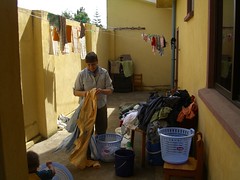Arusha Tanzania 2006 Day 12 - Maids
 It's weird to have a maid. For me as a middle-class American at least. My sister-in-law is also comfortably middle-class, by Tanzanian standards. She works as an Administrative Assistant for the UN...more on that in another post. It's a great job, she does great work, and they rent a lovely stone house where we are blessed to be staying.
It's weird to have a maid. For me as a middle-class American at least. My sister-in-law is also comfortably middle-class, by Tanzanian standards. She works as an Administrative Assistant for the UN...more on that in another post. It's a great job, she does great work, and they rent a lovely stone house where we are blessed to be staying.
With "middleclassedness" in Africa, often comes help around the house. My wife's other sister (Mo is 4th of 7 kids) and her husband were teachers in Zimbabwe and they had a maid. Even folks in the "lower-middle class" in Africa always seem to be able to find a maid. Sometimes the maid is someone who comes by for a few hours in the middle of the day, and might be the maid for two or three families, but just as often the maid is a live-in. Many times the maid is someone from just a bit further out of town than you live, and by hiring them as help you're getting them that much closer to town. The maid in this house sleeps and eats here six days a week, and takes Sunday off for church and family. She's very kind, and very quiet, but as is with the maids I've personally met in Africa, submissive isn't the word, rather deferential in all cases to the other members of the house. A maid might work with you for years, but they are an employee first, and possibly a family member second.
In the states, if you wanted a full-time live-in maid, you'd be paying around USD$25,000 to USD$40,000 to start, not to mention benefits. For nearly everyone this is not only beyond our means, but just an insane amount of money. You can hire a "merry maid" to come by once a week and do the floors and bathrooms and dust, but that'll be at least $50, usually $100 a month, and they don't do dishes or windows. Every country's economy is different, but a maid in Africa might make as little as US$20 a month, or as much as US$100 or more. Still, a far cry from the middle class.
The maids on this continent are really home-managers. Everything is handled, from meals to laundry to cleaning. There's also often a gardener or general handy-man who comes by in the daytime and is "the man when the man isn't around" and handles repairs and landscaping of the 25foot by 25foot patch of grass.
As an aside, not only does the power go out each day, but the water, as I'd mentioned before, comes from a large tank above the house. Turns out there's actually two tanks. One under the ground - a giant cistern - and the tank above. The city water comes in only once every 4 days - sometimes there's gaps as long as two weeks - and is buffered (my word) into this giant cistern. There's a large sturdy plastic balloon on the end of a thick wire - a ballast, just like in an American toilet, that floats up when the tank is full, indicating to the system to stop taking in the city water. Then the handy-man turns on a pump and sends the water up to the tank on top of the house. In the morning around 6am, the maid turns on a temporary water heater - everyone is very focused on conservation, naturally, and saves water and power religiously - and stores very hot water in a 30 liter or so container that stores wicked-hot water for the whole house.
Since we are numbering 11 in the house, we're stacked to the rafters, and I had a lovely cold shower this morning. Cold trickle, rather, but it, and I, was wet, so I consider it a dramatic success. I woke up at 7:30am, a little late, and because I didn't jump at the first shower, I lost. My wife had a stunning (she reported) hot shower. Of course, this house happily and comfortably supports a family of 4, but we're straining it a bit.
Back to the maid. We (the white folks, meaning, mostly my parents) are having a little trouble with it. I'm personally used it having traveled a smidge, but my parents, having traveled as much as a typical West Coast-born individual (from Vancouver, BC to Tijuana, Mexico, so, exactly, nowhere. ;) ) aren't used to the "distance" and caste-like system that is so pointed outside the states. There may be some liberal "White Guilt" involved, but I doubt it in this case as the castes (my word in this case) exist very often without color. I've never personally visited or lived in a White African's house who has Black help working for them (although there's many of course), while I've personally visited dozens of Black Africans' homes with other Black African folks working for them. This is fundamentally about the separation between the knowledge worker and the laborer, it seems. I suspect in the States, that many people (more than just the very rich) would hire maids to work and live with them if it were possible to pay them a non-U.S.-minimum wage and if the market and society watchful eye would bear it. In this case, as we visit, we have mostly "middle class" guilt. We're all very lucky, and if you're reading this blog, by definition and example, you are fortunate as well.
 My dad was a firefigher for thirty years and had odd jobs on the side. My mom was a zookeeper amongst other things. My mom puts it best: "Your father spend the last 30 years responding. He has to help. He doesn't know how not to." So, here in Tanzania, Dad's running all over the house fixing stuff. Not that things are breaking more than anywhere else, but you know how it is. A knob here, a clogged faucet there, standard house stuff. He's fantastic at this stuff. I think that the maid and handyman are reveling in the enthusiasm of this upbeat, very compentent, old(er) White guy. I'm enjoying the whole spectacle, myself. I one day hope to be as handy and as much a people-person as my Dad.
My dad was a firefigher for thirty years and had odd jobs on the side. My mom was a zookeeper amongst other things. My mom puts it best: "Your father spend the last 30 years responding. He has to help. He doesn't know how not to." So, here in Tanzania, Dad's running all over the house fixing stuff. Not that things are breaking more than anywhere else, but you know how it is. A knob here, a clogged faucet there, standard house stuff. He's fantastic at this stuff. I think that the maid and handyman are reveling in the enthusiasm of this upbeat, very compentent, old(er) White guy. I'm enjoying the whole spectacle, myself. I one day hope to be as handy and as much a people-person as my Dad.
From the maid's perspective, it's possible overstepping our bounds as house guests, Mo and I included, by doing chores as we think is appropriate. We've done the laundry (by hand out back), led by Mo's Mom. We sweep and mop and do the dishes, all the while with an askance look from the (again, very kind she is) maid. I guess it's a combination of our very American "we do it ourselves" style, along with my wife's very African "I need to be a contributing member of the household" style. Technically I assume the maid is supposed to do all these things, but we figure since the household has swollen in membership due to our arrival, it's only fair that we step up in some way. It seems to be working so far.
Our host, my sister-in-law, has been fantastic to open her home to us, and even though we've inadvertently sequestered a few family members to the couch and living room floor by our presense, the house and household are holding up nicely.
 I remember once in Zimbabwe I was kicked, rather forcefully, out of the kitchen of a Uncle of ours, for stopping in and offering to do the dishes. As the guest, and recent addition as son-in-law, my attempt to help was perceived as a bit odd and I narrowly avoided international incident. Not to mention when I sat on the ground rather than on the couch...I find the floor to be rather comfortable. Again, not cool when you're the visitor, it seems.
I remember once in Zimbabwe I was kicked, rather forcefully, out of the kitchen of a Uncle of ours, for stopping in and offering to do the dishes. As the guest, and recent addition as son-in-law, my attempt to help was perceived as a bit odd and I narrowly avoided international incident. Not to mention when I sat on the ground rather than on the couch...I find the floor to be rather comfortable. Again, not cool when you're the visitor, it seems.
I'd love to have a maid in the States, but I think that due to my overdeveloped sense of economic justice combined with a bit of, I fear, a socialist streak, it'll have to be a Robot Maid from the makers of the Roomba.
About Scott
Scott Hanselman is a former professor, former Chief Architect in finance, now speaker, consultant, father, diabetic, and Microsoft employee. He is a failed stand-up comic, a cornrower, and a book author.
About Newsletter
Here in South America the presence of live-in maids in middle class homes is usual. I believe that maids exist due to high unployment rates.
If USA would have the same rates as Latin America/Africa/Middle East/Part of Asia, the mades would be there.
Please don't get me wrong. I don't want to oversimplify the matter. My point is that maids are not a creation of a society, but of an economical situation.
This is a great blog, I enjoy reading it daily.
Its the same story in India. In fact my relatives who have settled down in USA as citizens find it extremely inconvenient to adjust to the lifestyle of having to be in control of every little thing in running a household. Back home the very same people were brought up among maid-servants who take care of everything including laundry, cleaning kitchen utils, cutting vegetables for cooking, mop the floor, clean the bathroom -- all for dirt cheap rates. If you are a software engineer in India, things are even better. You much so much money (I mean, comparatively) you end up living like some out-of-work King of some obscure kingdom.
BTW, I am from India and for some unknown reason I still live in the USA jumping from one contract developer opportunity to another.
Comments are closed.

Now, in Perth, we yearn for the times when it was possible to have someone clean our house and look after the kids for less than a kings ransom.
As you have discovered, black africans have no qualms hiring a maid or gardener, although often they are termed "sister" or "domestic" in South Africa, implying a familial connection or a real work description, unlike the colonial ( and demeaning IMHO ) terms "boy" and "girl" which used to be ( and probably still are in parts ) used in SA and Zimbabwe.
Your blog is fascinating, dealing as it does with several of my interests, .Net , development tools and Africa. Enjoy the rest of your stay in TZ.